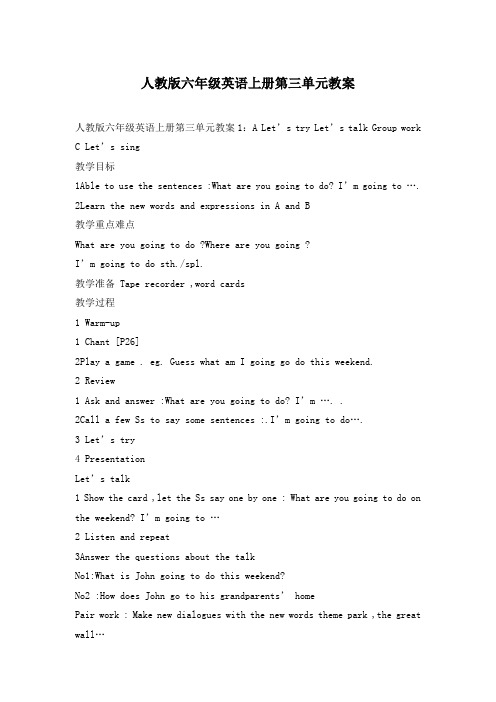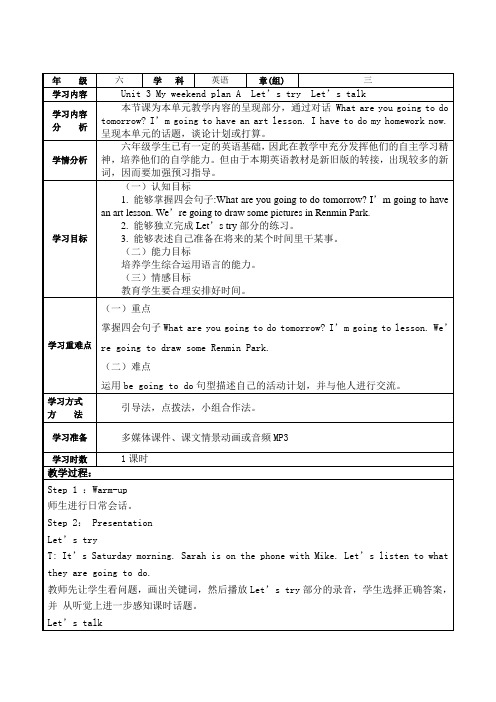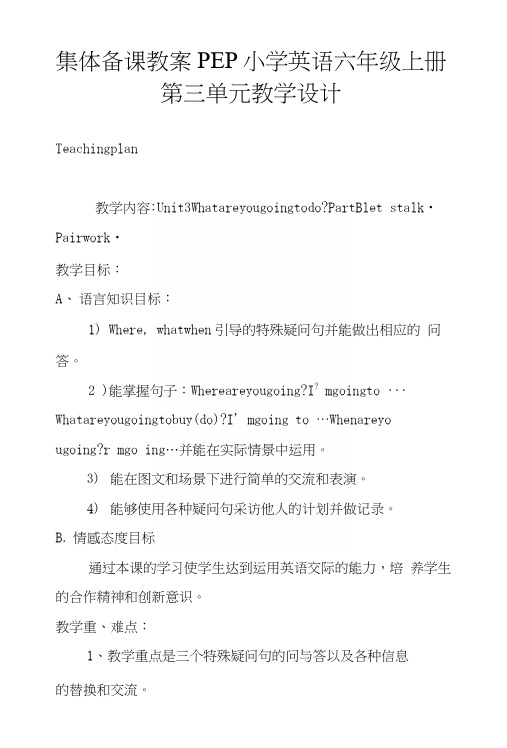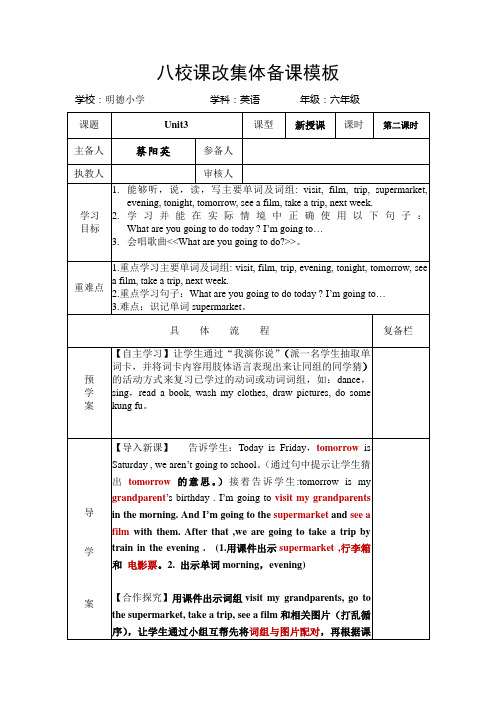教案模板正式六年级英语第三单元
人教版六年级英语上册第三单元教案

人教版六年级英语上册第三单元教案人教版六年级英语上册第三单元教案1:A Let’s try Let’s talk Group work C Let’s sing教学目标1Able to use the sentences :What are you going to do? I’m going to …. 2Learn the new words and expressions in A and B教学重点难点What are you going to do ?Where are you going ?I’m going to do sth./spl.教学准备 Tape recorder ,word cards教学过程1 Warm-up1 Chant [P26]2Play a game . eg. Guess what am I going go do this weekend.2 Review1 Ask and answer :What are you going to do? I’m …. .2Call a few Ss to say some sentences :.I’m going to do….3 Let’s try4 PresentationLet’s talk1 Show the card ,let the Ss say one by one : What are you going to do on the weekend? I’m going to …2 Listen and repeat3Answer the questions about the talkNo1:What is John going to do this weekend?No2 :How does John go to his grandparents’ homePair work : Make new dialogues with the new words theme park ,the great wall…5 Consolidation and extension1 Story time2 Exercises of the activity book人教版六年级英语上册第三单元教案2:A Let’s read教学目标1Able to use the sentences :What are you going to do? I’m going to …. 2Learn the new words and expressions in A and B教学重点难点What are you going to do ?Where are you going ?I’m going to do sth./spl.教学准备 Tape recorder ,word cards教学过程1 Warm-up1Everyday English : 2Chant2 Preview1Play the game2Act Let’s talk3 PresentationRead and write1 Show the pictures ,ask: What is he/she going to do ? lead the Ss to answer : He/She is going t o ….2 Teach sb.with sb.That will be fun!3 T says : Now let’s learn to know what is Liu Yun going to do on the weekend? Listen. T plays the tape and Ss read after it .4 Explain :5 Read the dialogue and ask the questions :1 What is Liu Yun going to do on Saturday?2 What is Liu Yun going to do on Sunday?3 What are you going to do on the weedend?4 Finish writing the questions.5Teach Ss how to write the four-skill sentences .Pronunciation4 Consolidation and extensionLet’s playDo the Exs of the activity book人教版六年级英语上册第三单元教案3:Let’s chant B Let’s learn Let’s play C Pronunciation教学目标1Able to use the sentences :What are you going to do? I’m going to …. 2Learn the new words and expressions in A and B教学重点难点What are you going to do ?Where are you going ?I’m going to do sth./spl.教学准备 Tape recorder ,word cards教学过程Warm-upEveryday English.PreviewShow the cards : take a trip / read a magazine /go to the cinema/ read the newspaper /Make a sentence with the new words.Let the Ss ask and answer : What are you going to do?PresentationLet’s learn1 T says the sentences and write the phrases on the Bb,then read after T . [dictionary-----buy a dictionary]2 Show the pictures and ask : What’s he /she going to buy ?3Teach the other in the same way .4Design a game .5Listen and repeat .Let’s chantTask timeConsolidationMain Scene Let the Ss look at Main Scene,devide the Ss into two groups ,then take turns to describe the actions .。
六年级上册英语第三单元教案

六年级上册英语第三单元教案Title: Unit 3: My WeekendsObjectives:- To introduce vocabulary related to weekend activities- To practice conversations about weekend activities- To reinforce the use of present simple tense in sentences Materials:- Flashcards with pictures of various weekend activities- Worksheets with sentences for practiceWarm-up:1. Greet the students and ask them about their weekends by using the following questions:- What do you usually do on weekends?- Do you have any special activities or hobbies you do on weekends?2. Play a game called "Weekend Activities Charades", where students take turns acting out different weekend activities while the rest of the class guesses.Presentation:1. Show flashcards of different weekend activities and elicit their names from the students. Vocabulary may include: going to the movies, playing sports, reading a book, hanging out with friends, baking cookies, going to the park, going swimming, etc.2. Use the flashcards to create example sentences in the presentsimple tense. For example:- I like to go swimming on the weekends.- My family often goes to the movies on Saturdays.- He enjoys playing sports on Sundays.Practice:1. Divide the class into pairs or small groups and give each group a worksheet with sentences about weekend activities. Students take turns reading the sentences and explaining whether they do those activities or not.2. Play a game called "Weekend Scenarios", where students have to create a short conversation using the present simple tense to talk about what they would do in different weekend scenarios. For example:- If it rains on Saturday, what will you do?- If you have a lot of homework on Sunday, how will you spend your day?Production:1. Have students work in pairs to create a mini-dialogue about their ideal weekend. Encourage them to use the present simple tense and include at least three different activities. They can use the flashcards for inspiration.2. Ask for volunteers to share their dialogues with the class. Summary:Review the main vocabulary and concepts covered in the lesson. Ask students to name a few activities they learned and how theycan use the present simple tense to talk about their weekends. Homework:Assign a written assignment where students write a paragraph about their favorite weekend activity using the present simple tense. They should include details about why they enjoy it and when they usually do it.。
六年级英语上册教学案第三单元教案

3.能够表述自己准备在将来的某个时间里干某事。
(二)能力目标
培养学生综合运用语言的能力。
(三)情感目标
教育学生要合理安排好时间。
学习重难点
(一)重点
掌握四会句子What are you going to do tomorrow? I’m going to lesson. We’ re going to draw some Renmin Park.
I’m going to have an art lesson.
We’re going to draw some pictures inRenminPark.
年 级
六
学 科
英语
章(组)
三
学习内容
Unit 3 My weekend planA Let’slearn
学习内容
分 析
本节课学习核心词组:visit my grandparents,see a film, take a trip, go th the supermarket,并能够运用核心句型What are you going to do today? I’m going to see a film.在真实的情境中进行交流周末计划。
(3) Let’s wrap it up 语法小结
a. Be going to 表达的意思 “打算要做的事情”
b. Be 动词的用法复习
Step3 .Practice
1、听音答题Question:What are Mike and Sarah going to do tomorrow ?
2、听音跟读
学习方式
方 法
引导法,点拨法,合作交流法。
集体备课教案PEP小学英语六年级上册第三单元教学设计.docx

集体备课教案PEP小学英语六年级上册第三单元教学设计Teachingplan教学内容:Unit3Whatareyougoingtodo?PartBlet stalk・Pairwork・教学目标:A、语言知识目标:1) Where, whatwhen引导的特殊疑问句并能做出相应的问答。
2 )能掌握句子:Whereareyougoing?I?mgoingto ••• Whatareyougoingtobuy(do)?I' mgoing to …Whenareyo ugoing?r mgo ing…并能在实际情景中运用。
3)能在图文和场景下进行简单的交流和表演。
4)能够使用各种疑问句采访他人的计划并做记录。
B.情感态度目标通过本课的学习使学生达到运用英语交际的能力,培养学生的合作精神和创新意识。
教学重、难点:1、教学重点是三个特殊疑问句的问与答以及各种信息的替换和交流。
交际。
三、教学准备:录音机、本课的磁带、头饰、单词卡片、多媒体课件、表格教学步骤St epl、热身(Warm-up)1 、Sayanddo.Sh akeyourbody.Shakeyours houlders, shu a, shua, shua・Shakeyourh ands, ca, ca, c a.Shakeyou rhip, pia, pia , pia・Shake yourfeet, don g, dong, dong・2、T:Doyouw anttoknowme?Listenandtel 1me:What smy name?What, sm yhobby?(Myna meisLily. Ili kereadingboo ksandshoppin g・ Ilikeeatin gfruits・Espe cially, Hike pets. Ihaveap et. Itsnameis Sunny. Ilikei tverymuch.)Step2、新课呈现及操练(Presentat ionPractice)1.T:Nation alDayiscomin g.Areyouhapp y?I 'mveryhap py. I,mgoingt odomanything s. Doyouwantt oknowwherela mgoingandwha tlamgoingtod o?Ss:Yes・T :Butfirstyou mustguesssom eriddles.Doy ouwanttogues s?Ss:Yes・T : Ihavefourri ddles .Thisis aplace .There aremanykinds ofbooksinit, youcanbuyorc hooseanybook syouwant. Whe reisit?Ss:It,sabookstore ・同时板书句型:I,mgoingtotheb ookstore.领读并提问:Wherearey ougoing?找几名学生回答。
六年级unit3ALet'sLearn教案

3.难点:识记单词supermarket。
具体流程
复备栏
预
学
案
【自主学习】让学生通过“我演你说”(派一名学生抽取单词卡,并将词卡内容用肢体语言表现出来让同组的同学猜)的活动方式来复习已学过的动词或动词词组,如:dance,sing,read a book, wash my clothes, drawpictures, do some kung fu。
2.学习并能在实际情境中正确使用以下句子:What are you going to do today ?I’m going to…
3.会唱歌曲<<What are you going to do?>>。
重难点
1.重点学习主要单词及词组: visit, film, trip, evening, tonight, tomorrow, see a film, take a trip, next week.
【课外拓展】Tomorrow is the weekend, make a plan and share
it with you partner.请学生利用书上的表格,独立制定周末计划,然后小组内询问周末的打算,进行对话。
【板书设计】unit3
visit my grandparents goto thesupermarket
【合作探究】用课件出示词组visit my grandparents,goto thesupermarket,take a trip,see a film和相关图片(打乱循序),让学生通过小组互帮先将词组与图片配对,再根据课本词汇表的音标试拼读新单词。看看哪组快又准,在规定时间内配对和拼读多的组获胜。
PEP小学英语六年级上册第三单元A部分优秀教案和课后反思[学习资料]
![PEP小学英语六年级上册第三单元A部分优秀教案和课后反思[学习资料]](https://img.taocdn.com/s3/m/213bb0ec05087632311212ab.png)
PEP小学英语六年级上册第三单元A部分优秀教案和课后反思
教材分析
1.能够用be going to do 句型交流行事计划,如:what are you going to do this evening?Iam going to the cinema.能够了解他人的计划并进行转述。
2.培养学生合理安排自己的学习与生活的能力,培养学生从小树立远大理想并为之努力的思想意思。
学情分析
1.通过一阶段的接触,我足够的了解和掌控课堂活动的动态,能把握好课堂氛围。
2.学生认知发展分析:学生有了自己的计划和询问他人计划的能力,并了与表达自己的计划。
3.学生认知障碍点:基础知识薄弱。
教学目标
1.能够用be going to do 句型交流行事计划,如:what are you going to do this evening?Iam going to the cinema.能够了解他人的计划并进行转述。
2.培养学生合理安排自己的学习与生活的能力,培养学生从小树立远大理想并为之努力的思想意思。
教学重点和难点
1.能够用be going to do 句型交流行事计划,如:what are you going to do this evening?Iam going to the cinema.能够了解他人的计划并进行转述。
2.掌握教材配套的词汇,。
pep六年级上册英语第三单元教案
英语学科六年级上册第三单元教学预案第一课时一、教学目标与要求1.能够听、说、认读句型:“What are you going to do this evening I'm going to the cinema.”并能对其中的动词和时间短语进行替换操练;2.能够听、说、认读动词短语:take a trip,go to the cinema,read a magazine.3.能够听、说、读、写短语:next week,this morning/afternoon/evening;并能够听、说、认读时间短语:tomorrow,tonight.4.能够在Pair work中合理安排自己的活动时间并与他人进行交流;二、教学重、难点分析1.本课时的教学重点是能够听、说、读、写Let's learn部分的四会短语;并能替换 going to do句型中的动词和时间短语对将来的活动进行表述; 2.本课时的教学难点也是四会词汇的听、说、读、写以及对be going to do 句型了解和替换操练;三、课前准备1.教师准备动词短语卡片,如:take a trip,go to the cinema等;2.教师准备Let's start部分的教学挂图;3.教师准备录音机和本课时的录音带;四、教学步骤和建议1.热身Warm-up1教师课前放歌曲“What Are You Going to Do ”学生初步感知be to do句型;2师生进行日常会话,可将重点放在动词短语的问答上,如:T:What day is it todayS:It's Tuesday .T:What day is it tomorrowS:It's Wednesday .T:What do you usually do On Wednesdays/in the eveningS:I usually read books.…2.预习Preview1教师出示课前准备好的课程表,说“Look We have so many classes in a指着Monday说:“What classes do we have on Mondays'’帮助学生一起说“On Mondays,we have English,Chinese,math.…”再请学生回答其他几个的课安排;2教师出示当天的日历,师生进行如下问答:丁:What day is it todayS:It's Monday/Tuesday.…丁:What time is it nows:It's 9 o'clock.根据实际时间丁:What are you doing now Tomorrow afternoon”等;3.新课呈现Presentationtomorrow,next week,师生拼读其中的四会短语;3“演一演、猜一猜”活动教师准备好动词短语卡片,如:play spots,go hiking,dO morning exercises.the cinema,take a trip,read a magazine等以及相关道具,如电影票、杂志、背包、太阳帽等;生抽出一张卡片,根据上面的图片或文字,用动作表现出来,其他学生猜是什么短语;当有学生抽到新短语read a magazine时,教师可引他借助杂志来进行表演,其他学生由此可能会猜:read a book,教师借机引入词magazine;教师可将take a trip留到最后自己表演,借助背包、太阳帽,产生可能会猜出是go hiking,教师说:“No,I'm going to take a trip.引出新短语take a trip; ’教师可设立“最佳表演奖”来鼓励学生进行创造性表演,也可设立心有灵犀奖”来鼓励学生踊跃竞猜;4教师放课文的录音,学生静听一遍后跟读,教师可对‘I’m going to the cinema.加以解释,语法规则见教学参考资料库;随后学生两人一组进行练习,教师引导他们主动替换对话中的时间和动词短语,进行更为广泛的操练;Pair work教师出示Pair work部分的表格,说:Look Here are some activities thatare good for you.Please decide when you are going to do them and tell your partner.Pay attention:You can do them in two weeks.学生先在表格中填时间短语,然后进行结对操练;教师请几组学生演示对话;4.巩固和延伸Consolidation and extension1学生抄写本课时的四会词汇;2学生以表格形式安排自己第二天的活动并向朋友或家人介绍;3学生跟录音学唱歌曲“What Are You Going to Do ”4学生做活动手册的配套练习;课后反思:A这堂课的教学设计紧密联系学生的实际生活的,让学生通过be going to do 句型交流行事计划;在教授时注重时间短语和动词短语的搭配教学,来巩固句型和新授知识的实际应用能力,这样可以让学生活学活用,易于接受;B引导性的道具,使抽象中的概念引领到实际的概念中;如电影海报---go to the cinema;C在实际的教学过程中,可能是太注重内容的输送,对学生扎实的掌握所学语言基本功有些忽视,师生之间的互动不足,单词和句子操练不足,导致学生所表达的内容很局限,这还需进一步的改善;第二课时一、教学目标与要求1.能够听、说、读、写句型:What are you going to do on the weekend I'm going to visit my grandparents this weekend.2.能在Group work部分合理安排周末的旅游项目;3.能够完成Let's try部分听录音判断对错的练习;4.能够听懂、会唱歌曲“What Are You Going to Do ”二、教学重、难点分析1.本课时的教学重点是学生能准确、自如地运用并会书写be going to do句型描述自己的活动计划与他人进行交流;2.本课时的教学难点是听、说、读、写四会掌握句型:What are you going to do on weekend I'm going to visit my grandparents this weekend.三、课前准备1.教师准备一张简明地图,图中标有ZOO,theme park,cinema,school,bookstore,post office,pet shop等场所;2.教师准备一张当地的简明旅游图;3.学生以四人为小组准备当地的简明旅游图;4.教师准备录音机和本课时的录音带;四、教学步骤和建议1.热身Warm-up1 教师课前放歌曲“What Are You Going to Do ”2学生根据自己设计的表格向其他学生介绍自己一天的活动安排,如:Today is Friday.I'm going to have some classes this morning.I'm going to read some books this afternoon and visit my grandparents this evening.I'm going to have a good day2.预习\PreviewLet' try教师说:“The National Day is coming.I have a friend in Shanghai.What is she going to doLet's listen to the tape and find out.”教师可分三次放录音,并根据学生的际情况有针对性地提问;学生听录音、回答问题并完成判断正误的练习;可供考的问题如下Where is she going ②How is she going there③Who is she going with Is she happy ⑤What is she going to buy3.新课呈现PresentationLet's sing教师接着Let's try部分说:The girl is going to Be doing on the National Day.She's very happy.Now let's listen to a song and find out what thechildren are going to do on Saturday. OK教师放C部分的歌曲,学生跟唱两遍后分师生、男女生或在小组间展开对唱; Let's talk1对唱结束后,教师出示标有动物园、电影院等地点的简明地图,并圈出动园所在位置,说:“The boy/girl根据歌曲录音中的声音is going to ZOO.His/her home is here.教师指着地图中离动物园较远的某一地点Is it far from the zoo ”学生回答:“Yes,it is far from the zoo.'教师再问:“How can he /she get to the zoo ”引导学生回答:“By bike/bus/taxi.”等;然后教师与学生进行如下对话:T:What are you going to do on the weekend/tomorrow morning/this Sundays:I'm going to the zoo.T:Is it farS:Yes,it is.教师引导学生继续说:So I'm going by bus/car/subway. T:Have a nice day/morning师生间可调换角色进行会话,以使学生更加全面地熟悉句型;2教师放Let's talk部分的录音,学生跟读并分角色朗读;学生开展组与组之间的朗读比赛,教师鼓励学生对对话中的时间和地点进行替换;3教师出示打乱顺序的单词卡片,如:what ,do,going,are, the,to,you,weekend. 又如:I,going,visit,to,am,my,this,grandparents,weekend;要求学生在最快时间内组合成句;师生一起拼读其中较难的单词如:weekend,grandparents,visit; 4教师引导学生书写四会句型;Group work教师出示当地旅游图,师生可先就旅游景点自由会话,如:“Where is it How do you go there”等;然后教师布置任务Now you are a tour guide.Please write a schedule for this weekend.See who can design the best schedule for us.学生先在课文表格中写出自己的活动设计,并在小组内进行表述;组内推选出一名“最佳小导游”,如果时间允许还可举行全班性的比赛;4.巩固和延伸Consolidation and extension1学生朗读本课时的对话;2学生抄写四会句子;3学生对自己的周末活动做出详细安排,并以表格形式写出;4学生将本单元的歌曲唱给家人或朋友听并录音.5学生做本课时的活动手册配套练习;课后反思:在对话教学中,多进行PAIR WORK是非常重要的,但是进行小组间的合作对话又是比不可少的,为此我摸索着进行两套思路的教学:一、“以本为本”读对话;新授课完成后立即给学生5分钟左右的时间,以四人小组为单咬准每一个音,发好每一个单词,尽量模仿录音中的语音、语调,把整个对话完整、流利、整齐地朗读出来;二、“合作创造”编对话;这一阶段的训练旨在培养学生对场景的想象能力,以及对在适当的场景里运用适当、得体的语言的判别能力;这是一个自主学习,自觉“消化”的过程;此时还是以四人小组为单位,但这时更充分体现了任务型教学,更强调合作学习,我要求小组围绕话题展开讨论,大胆创设各类场景来运用所学知识第三课时一、教学目标与要求1.能够读懂Let's read中的段落,并根据段落内容写出提纲式的LiuYun's weekend plan.2.能够模仿文段内容陈述自己的周末活动安排;二、教学重、难点分析1.本课时的教学重点是阅读段落并根据段落内容进行第三人称的转述,掌握第三人称寸be going to do句型的用法;2.本课时的教学难点是转述时第一人称与第三人称的人称代词与物主代词的变换;三、课前准备1.教师准备若干张表格形式见教学过程说明;2.教师准备录音机和本课时的录音带;四、教学步骤和建议1.热身Warm-up1教师课前放学生录制的本单元歌曲的录音,全班一起欣赏并评一评谁白最动听;2师生同唱歌曲“What Are You Going to Do ”3教师出示第二课时中the Great Wall,theme park和当地部分名胜及各种如bookstore,pet shop的图片包括生词supermarket;先请一名学生示范问答,如:What are you going to do this morning I'm going to visit the Great Wall.How do you get there By train.…教师鼓励学生踊跃提问,而非师生间单向问答; 2.预习Preview教师请几名学生介绍自己的周末安排;在学生介绍的过程中,教师可根据提出更细节性的问题,姐“When are you going to get up on Saturday Where are you going on Saturday morning How are you going to the zoo”等;在一名学生答之后,教师给予评价,如:“Wonderful You're going to have a busy weekend,are you ”等,并向其他学生提问:“What is A going to do on Saturday morning he is going with”等,引导学生将第一人称改为相应的第三人称进行回答,生回答的内容以短语形式填课前准备好的表格中,表格形式如下:完成表格后,教师说:“Amy is going to have a busy weekend.”板书have:weekend,引导其他学生以“I'm going to have a busy weekend.”为开头介绍周末安排,并邀请其他学生做简单记录,对于其中涉及的非四会词汇或其他的词汇可师生一起拼写;3.新课呈现PresentationLet's read1在几名学生汇报完周末活动安排后,教师广泛而快速地询问其他学生:What are you going to do on Saturday/Sunday morning ”等,确认学生能正确使用句型:“I'm going to…”来回答;2教师接下来说“Liu Yun is going to have a busy weekend,too.What is she going to doPlease read the passage and answer my questions.”教师可以根据段落内容顺序设计问题,让学生朗读一遍课文后依次口头回答;可供选择的问题如下:①What is Liu Yun going to do On Saturday②What is she going to buy7.③What is she going to do at home④What is she going to do on Sunday⑤Who is she going with⑥What is she going to do in the evening⑦What is her weekend like3学生以小组为单位讨论并回答问题,如有不同答案,师生共同探讨,找出最佳答案;4教师放课文录音,学生跟读两遍后全班一起朗读,再自由朗读课文l一2遍;5学生独立填充Liu Yun's Weekend Plan,并在组内互相讨论,交流与校对; 6“找伙伴”活动教师请每名学生在一张小纸条上写下自己的周末安排1—2项,如:“I'm going to play ping-pong On the weekend.”等,随后在教室里自由询问:“What are you going to do On the weekend ”如遇到有相同安排的学生即说:“Greate can play together.”再一起去问其他同学,看谁找到的伙伴最多,最后小伙伴们一起向教师和其他同学汇报自己的周末安排;4.巩固和延伸Consolidation and extension1学生模仿跟读Let's read的录音,并把自己的朗读录音后交给教师;2学生模仿课文表述自己的周末活动安排;3学生做活动手册的配套练习;教学反思:小学六年级的学生,由于其生理和心理都在发生着急剧的变化,因此,英语课堂上表现出来的性格也渐渐由外露变得比较内敛、害羞和敏感;根据这种细微的变化,我抓住学生争强好胜的心理,以朗读教学为突破口即在对本课时基本都理解的基础上,以小组学习、比赛为基本形式,力求使每一位学生都积极主动参与到教学活动中来,在听中模仿,在读中练,再在同桌之间的交流中提高;为此选择六年级英语课本中每单元的第三课为材料,具有很强的知识融合性和概括性,学生通过反复的朗读与自编,既达到了复习巩固的目的,又无形中大大培养和提高了学生的学习兴趣,为进一步的教学埋好伏笔;教学目标对于这部分对话的要求不仅是按部就班地“学会”,更强调能灵活地“学以致用”第四课时一、教学目标与要求1.能够听、说、认读单词或词组:dictionary,post card,newspaper,magazine,comicbook;并能够书写post card;newspaper和comic book;2.能够听、说、认读句子:“What are you going to do I'm going tO buy an English book in the bookstore.When are you going This afternoon.”并能进行关键词的替换练习;3.能够用所学句型“What are you going to buyI'm going to buy…”进行Let's play部分的购物活动;4;.能够听瞳并会吟唱Let's chant部分的歌谣;5.能够了解音标/a:/,/A/,/el,/O/,/m/,/n/,/o/的音和形并会朗读相关例词;能够完成Read and match部分看图、读音标、辨词形后连线的练习;二、教学重、难点分析1.本课时的教学重点是听、说、读、写四会单词和短语;2.本课时的教学难点是三会单词dictionary的发音、四会单词的拼写和Pronunciation 部分字母组合th的两种发音;三、课前准备1.教师准备本课时的单词卡片及不同科目的课本,如:English book,Chinese.,;等;2.教师请学生帮助,模仿Let's play部分的插图在课前对教室进行布置,准备5—6处“卖书点”;3.教师自制Pronunciation部分的挂图,对折后在背面写上单词Dictionary; 3.教师准备录音机和本课时的录音带;四、教学步骤和建议1.热身Warm-up1学生朗读Let's read的段落进行复习巩固;2学生陈述上节课后模仿课文设计的周末活动安排,教师根据其陈述内容提问其他学生,如:“What is he going to do on Saturday morning ”请他们回答,如:is going to….2.预习PreviewLet's chant1教师听完几名学生陈述后说:What a nice weekend Now let's listen to the music and try to find out what the child is going to do today.教师用幻灯片或投影片展示Let's chant的歌谣,然后放录音,学生看文字听,再跟节奏吟唱;2教师可简单解释歌谣中学生初次接触的短语,如take a sleep;师生根据歌谣内容进行问答,如:Are you going to buy a book/bake a cake Yes,I am. 3.新课呈现PresentationLet's learn I1教师继续Let's chant部分的提问:"Are you going to buy a book,too ”在有生回答“Yes,I'm going to buy a book.”或“Yes,I am.”教师再问:“Wheredo you buy a book ”学生回答:“In a bookstore.”2教师接着提问:“What books can you buy in a bookstore'’启发学生回忆学过的书籍词汇,如:English book,Chinese book,math book,music book,science book等,学生回答出一种书,教师即出示一本该书的实物,把它们一一放在书架上,师生一起拼写这些单词; .3教师可通过继续出示实物的方式,依次呈现生词:comic book,dictionary, newspaper,post card,也可通过与story-book的比较呈现comic book;还可用简单的英语进行解释,请学生猜是哪个生词,如:“Dictionary:In this kindof book;we can find many new words.It is helpful to us.Post card:When New Year's Day is coming,we often send them to our friends.”在呈现过程中,师生一起拼读生词中的四会单词;4学生进行单词拼写比赛,可以口头进行;还可利用单词卡片背面的灰体词进行描红比赛,学生边描边拼读,看谁既快又好,以帮助记忆本课时四会单词;Let's play教师布置学生课前每人带2—3本图书并布置好5—6处“卖书点”仿照课文Let's play中的插图;每处“卖书点”由2—3名学生担任销售人员,其他学生自由购书;教师先与学生进行示范对话,可结合前几册学生用书中所学有关购物的句型对对话进行拓展,如:r:Good afternoon/morning;S:Good afternoon /morning.了:What are you going to buys:I'm going to buy a comic book.r:OK,It's l0 yuan .s:I'll take it.Thanks.卖出书本最多的学生获“最佳营销员”奖,其他学生每人至少购得2—3本图书;教师在学生活动过程中应注意观察,随时发现有创造性、有延展性的对话并及时鼓励有出色表现的学生;Let's learnⅡ教师放Let's learn部分的录音,学生跟读后对其中的书籍名词和时间短语进行替换练习;Pronunciation1教师出示对折后写有Dictionary字样的Pronunciation部分的挂图说:Look I have a dictionary.You Can find many new words in it.Can you read them 教师呈现Pronunciation部分的音标和单词,放录音,让学生仔细听,感知音标的音与形;然后教师示范朗读,学生跟读;尤其是th的两种发音,教师应请学生仔细对照口型模仿朗读;2Read and match学生跟读录音2—3遍后独立完成连线练习;4.巩固和延伸Consolidation and extension1学生抄写本课时四会词汇;2学生朗读Pronunciation部分的例词,并试着找出更多的例词,同学之间剞交流;3学生听录音吟唱Let's chant部分的歌谣;4学生做活动手册本部分的配套练习;第五课时一、教学目标与要求1.能够听、说、认读what,where,when引导的特殊疑问句并能做出相应回答; 2.能够听、说、读、写四会句子:Where are you going this aftenoon I'm goingbookstore.What are you going to buy I am going to buy a comic book.3.能够听懂Let's try部分的对话并完成听音选图的练习;4.能够使用各种疑问句釆访他人的活动安排并做记录;二、教学重、难点分析1.本课时的教学重点是三个特殊疑问句的问与答以及各种信息的替换和交流;2.本课时的教学难点是学生能运用what,where,when疑问句进行真实的交际以工组四会句型的正确书写;三、课前准备1.教师准备一张简明地图,标出bookstore,shoe store,fruit stand,pet shop等场所;2.教师准备各商店所出售的货物的小卡片;3.教师准备录音机和本课时的录音带;4.教师课前在黑板上画出下列表格:四、教学步骤和建议1.热身Warm-up1全班一起吟唱Let's chant的歌谣;2单词拼写竞赛要拼写的单词包括:this morning/afternoon/evening,next week,newspaper,postcard等;可采取小组合作的“接龙式”拼写形式;也可以选取组内一名学生拼写全部单词;拼出单词最快最多的组获胜;3教师出示简明地图,师生问答如下:r:What shop is its:It's a bookstore.r:What can you buy in the bookstores:…在学生回答各商店所出售的物品时,教师根据其回答贴出物品的小卡片,如:Fruit stand:orange,apple,pear,banana….Shoe store:sneakers,sandals,boots….此时可引导学生说“a pair of sneakers/boots'’等2.预习PreviewLet's try教师指着地图中的商店及各商店所出售的物品说:LookThere are so many storesand so many goods.Let's listen to the tape and find out:①Where is Sarah going②Whatis she going to buy ③Who is she going with教师放三遍Let's try部分的录音,以上问题可根据学生的实际情况分三次提出,直到多数学生能回答并能将前两项答案填人教师课前画出的表格中;在填表过程中,教师请学生一起拼写其中的四会单词,如:bookstore,comic book;录音内容如下:Chen:Hi,Sarah,where are you going after schoolSarah:Hi,Chen Jie. I'm going to the bookstore.Chen:What are you going to buySarah:I'm going to buy a dictionary.Chen:1 want to buy a comic book.Let's go togetherSarah:OK3; 新课呈现PresentationLet's talk1“我的购物计划”活动教师指着黑板上的简明地图及表格说:Look,Sarah and Chen J1e are going tbookstore.Where are you going What are you going to buy When are you go Please write a shopping plan.指导学生结合表格中的购物地点、时间及商品三项提示,根据自己的购物;制定一个购物计划,组内学生可以互相交流讨论; 嘉学生做好计划后,师生根据表格中的三点要求:where,what,when进行o 教师将获得的信息表格,如:了:Where are you goings:I'm going to the fruit stand.r:What are you going to buys:I'm going to buy some apples.r:When are you goings:I am going at 5 o'clock in the afternoon.教师先与几名学生进行上述对话,再由学生提问来获知教师的购物计划由学生将有关信息填人表格中; 学生两人一组互相丫解对方的shopping plan,灵活运用where,when,what导的三个疑问句互相提问和回答;2教师放课文的录音,学生静听后跟读,再分角色朗读;3学生两人一组根据课本上的替换图对对话中的各种信息进行替换,教师文指导,并请几组学生进行示范;4教师引导学生进行四会句子的书写;Pair work1学生两人一组相互采访,根据表格中提供的三个疑问句了解同伴当天下午活动安排不一定是购物,并简要记录信息;2教师请几组学生在班级内演示采访过程;教师可对采访者的采访记录进行调查和评价,也可在不同桌的学生之间展开互评;4.巩固和延伸Consolidation and extension1学生抄写本课时的四会句子;2学生课后对父母或朋友的近期活动进行采访,记录结果并录音,把文字及料以及录音材料交给教师;3学生吟唱本单元的歌谣,录音后与录音带进行比较,不断改进语音语调;第六课时一、教学目标与要求1.能够听、说、认读Let's read部分的对话;2.能够根据对话内容回答文后的问题;3; 能够就自己20年后的理想状况进行讨论;4.能够理解Good to know部分的内容;5.能够完成Let's check部分听音选图的练习;二,教学重、难点分析本课时的教学重点和难点是听、说、认读Let's read部分的对话;三、课前准备1.教师准备各种职业的单词卡片,如:soldier,doctor,nurse,farmer,English teacher,Chinese teacher,science teacher等;2; 教师准备关于文字记载方式的发展演变的图片或影视资料片.3.教师准备录音机和本课时的录音带;四、教学步骤和建议1.热身Warm-up1师生一起吟唱Let's chant部分的歌谣;2教师出示各种职业的单词卡片,与学生进行问答:“What is he/sheHe’s/She's a doctor.”等;教师把职业单词写在黑板上;2.预习Preview.Task time1教师指着黑板上各种职业的单词说:“Everyone has a dream.What are you going to be in the futureDiscuss with your partner.”引导学生使用“I'm going to be a…”进行分组讨论,教师指导并适当记录学生的讨论情况;2教师与学生快速问答,如:r:What are you going to be one days:I'm going to be a teacher.r:Oh,you want to be a teacher.每项问答后教师都用这句话做总结,也可逐步引导学生使用句型“1wanttObe…”进行回答;3.新课呈现PresentationLet’s read1教师进行总结说:“You're great.You have many wonderful dreams.Sarah has awonderful dream ,too.What is she going to be one day What is she going to do this weekend Let's read a dialogue.”学生仔细阅读对话,教师走动答疑;2教师请学生简要回答刚才提出的两个问题,如:“A science teacher.Plant trees.”然后师生间自由会话:“Do you want to be a science teacher' ’教师根据学生的回答继续提问:“Do you like plantsAre you going to plant 教师作思考的表情,停顿一下说:“What elseLet me see.…”然后做出想起的样子,问:“Are you going to read any magazines about plants Do you need magazines about plants'’教师板书a magazineabout potato 师生自由会话后一起朗读文后提出的问题,学生再带着问题默读或朗读对蟧;同桌之间或组内同学可以互相讨论问题的答案并在横线上书写答句;4教师请学生回答问题,全班进行核对;教师提醒学生注意拼写准确、书写规范; 5教师放课文的录音,学生跟读后全班一起朗读,然后分角色朗读;Good to know教师引入该部分教学:Some of you want to be Chinese teachers.So you should know something about the history Of Chinese writing.教师借助图片或影视资料片介绍该部分,扩充学生的知识面;4.巩固和延伸 Consolidation and extension1Story time教师说:Zoom has a dream,Let's watch the VCD.too.He wants tO learn how to swim.How does he learn教师放Story time的VCD也可以呈现挂图并放故事的录音;学生观看后讨论故事的涵义,体会“Learn by doing.”的道理;2Let's check教师放录音,学生听录音选出正确选项;。
六年级英语上册第三单元教案
六年级英语上册第三单元教案教案标题:六年级英语上册第三单元教案教学目标:1. 通过本单元的学习,学生能够掌握以下词汇:school, library, playground, classroom, computer room, music room, art room, science lab, gym, canteen。
2. 学生能够准确使用句型"What's on the...?" 和 "Where is/are the...?" 来询问和回答学校不同地点的位置。
3. 学生能够描述学校的不同地点,并能够就自己喜欢的地点进行简单的陈述。
教学准备:1. 教学课件和多媒体设备2. 学生课本和练习册3. 单词卡片和图片4. 地图和学校平面图教学过程:Step 1: 导入新课 (5分钟)1. 通过展示图片和单词卡片,引导学生回顾和复习关于学校不同地点的词汇。
2. 利用图片和单词卡片进行游戏,让学生快速说出图片或卡片上的单词。
Step 2: 学习新知 (15分钟)1. 向学生展示学校平面图,并引导学生用"What's on the...?" 和 "Where is/are the...?" 的句型来询问和回答学校不同地点的位置。
2. 教师示范并与学生一起练习对话,例如:Student A: What's on the second floor?Student B: The library is on the second floor.Student A: Where is the library?Student B: It's next to the classroom.3. 学生分组进行练习对话,教师巡回指导并纠正他们的发音和语法错误。
Step 3: 巩固练习 (20分钟)1. 学生根据学校平面图,用英语向同伴描述自己喜欢的地点,并回答同伴提出的问题。
2022六年级英语上册第三单元教案5篇2022
2022六年级英语上册第三单元教案5篇2022在教学中,认真备课,认真阅读教科参考书,结合自己的教学经历与学生的学习情况,认真编写好教案制定好教学方案。
在传授学生知识的同时,关心保护学生,特别是差生,课堂亲密注意他们,教育他们求学勿半途而废。
以下是WTT带来的2022六年级英语上册第三单元教案内容,感谢您的阅读,希望能帮助到您!2022六年级英语上册第三单元教案1P1-2I. 1. B, have 2. B, watching 3. C, in 4. A, She'sII. 1-5BABCC 6-10ABBACIII. Kerry's, years, England, teaches, numberIV. 1-5 CBABCP3-4I. 1-5ABADDII. 略III. 1. (1)from (2)about (3)at (4)to (5)at (6)in (7)by (8)with(9)with/about/to/of (10)from2. (1)playing (2)obey (3)ask (4)open (5)goes (6)have (7)do (8)paint(9)drawing (10)flyingIV. does…do…plays; does…works…office; playing the pianoP5-6I. 略II. 略III. I get up at six-thirty. My father gets up at six. My mother and mysister get up at seven.IV. 1-6ABCAACV. 1-5 TTFTFP7-8I. 略II. Women's Day-- March 8thChildren's Day-- June 1stTree Planting Day-- March 12thTeachers' Day-- September 10thLabour Day --May 1stNew Year's Day-- January 1stFather's Day-- the third Sunday in JuneNational Day--October 1stThanksgiving Day-- the fourth Thursday of November Mother's Day-- the second Sunday in MayChristmas Day-- December 25thIII. 1. from…to 2. in 3. playing 4. collecting 5. like 6. waters 7. has 8.is 9. at 10. WhatIV. 2-3-4-1-5V. 1-5 T F FTTVI. 略P9-10I. 1-5CBACB 6-8CBAII. 略III. planting lowers—种花 drawing—画画collecting sts—集邮playing volleyball—打排球 singing—唱歌 playing basketball—打篮球IV. es, goes, says, friendly, all, 1. F 2. F 3. T 4. FV. 1-5 ABCBC2022六年级英语上册第三单元教案2The first dayI.1-5 ACACDII.1-5 BAACD/B 6-10 CCACA 11-15 DCBBC The second dayI.1-5 DCAAD2.goes to by plane3.do some shopping4.enjoy themselves5.other things the birthday songte forIII.1. sell, buy2. is sitting, is running3. to close4. sells5. Does, have6. read7. driver, driving8. to go9. is drinking10. is havingThe third dayI.1-4 CDEB 5-8 AGHFII.1. carry 2. watches 3. shopping 4. driving 5. is 6. to e 7. teaching8. reading 9. to clean 10. to writeIII.1-5 FTTFFThe fourth day2. C swimming3. A Don’t4. B take5. B wrongII.1. We don’t call it a small lion.2. They are playing with their mother.3.What do you do in your science corner?4. What’s wrong with you?5. My school is famous for its sports.6. Can you show me those trousers?III.1-5 AABCA 6-10 ACBCA2022六年级英语上册第三单元教案3一、教材分析^p本学期的主要内容为PEP小学英语六年级下册,共有4个教学单元、2个复习单元。
新PEP六年级英语上册第三单元教案设计
适用文档1.能达成“ Let’s try ”部分的听力,“ Let’s talk”的学做准。
2.能运用句型“ What are/is ⋯ going to do? ”来未来的活安排。
3.能运用句型“主 +be+going to ⋯”往返答未来的活安排。
4.能用正确的音朗并行角色表演。
5.能培育学生合理安排、划活的。
能听、、、句型:What are you going to do tomorrow?/I’m going to have an art lesson./We’re going to draw some pictures in Renmin Park.能运用句型“ be going to”来自己的活划。
Step 1:Warm-up师生简单对话,复习动词短语,如:T:What do you do on Mondays?S1:I do homework and play football.T:What do you do on weekends?S2:I usually wash clothes and go for a picnic.Step 2:Presentation1.Sing the song “Where is the hospital?”,带动学习英语的气氛。
2.介绍“ Let,s talk”部分的背景,并准备播放听力。
Wu Yifan and Robin are in the museum.They are looking for,s see what,s going on.播放听力,听第一遍时,跟读录音,模拟听力中的语音语调,做到准备发音,听第二遍时,思虑以下问题:(1)Where is the museum shop?What does Wu Yifan want to buy?(2)Where is the post office?Why does he want to find the post office?播放第三遍听力,学生回答出提出的问题,并思虑对话的大体意思 1.达成“ Let’s try”(1)介绍背景部分的任务。
- 1、下载文档前请自行甄别文档内容的完整性,平台不提供额外的编辑、内容补充、找答案等附加服务。
- 2、"仅部分预览"的文档,不可在线预览部分如存在完整性等问题,可反馈申请退款(可完整预览的文档不适用该条件!)。
- 3、如文档侵犯您的权益,请联系客服反馈,我们会尽快为您处理(人工客服工作时间:9:00-18:30)。
单 元 主 题 Unit 1 How can I get there? 课题 Unit 1 How can I get there?第三课时 授 课
教 师
王夏莲
教学目标:
1. 帮助学生理解对话,并学会运用句型“How can we get there?”问路。
2. 帮助学生学会运用词组“turn left, turn right,”等表述路线。达
到简单的交际。
教学重点: 重点: 学生能够充分理解并正确朗读对话。
教学难点: 难点:如何正确的表述路线,指引他人到达目的地。
教 法:
用游戏形式复习单词、句型,练习新语言点,使学生寓学于乐,
在活泼、轻忪、愉快的气氛中自然而然地获得英语知识。
教学准备: 多媒体课件。
前置预习:
把“Let’s try”部分的图片用课件呈现给学生,让学生边看图边听
录音,然后根据听到的内容选择出正确的答案。
教与学的活动
修改补
充内容
1. Warm---up (热身及预习展示)
(1)教师出示地图,让学生根据地图描述某地的位置。
(2)Let’s try: 教师先让学生阅读句子然后听录音完成练习。
(3)Free talking
T: Can you guess which food is favorite?
Ss: ...
T: I like pizza best. Where can I buy the pizza? Yes, it’s
restaurant. It’s Italian restaurant.
教师领读单词: pizza, Italian restaurant
(二)Presentation and practice(精讲点拨)
Let’s talk
(1)教师出示地图,说:“Now, I want to have some pizza, I
want to go to the Italian restaurant. How can I get there?”。让
学生先画出路线,然后教师引导学生表述路线: Turn left at
the ... .Then turn right at the .... 再请同学来说说他们的路线。
(2)朗读课文对话,分角色完成对话。或小组内朗读表演对话。
3. Consolidation and extension(拓展延伸)
(1)教师课件出示兰州市或安宁区的地图,请学生小组内完成
对话。
How can I get to the ...?
Turn ... at the .... Then turn ... at the...
(2)教师用单词卡片在黑板上拼一个地图, 先让学生自己说
一说路线, 然后请一个学生通过抽卡选出他的出发地和目的
地,并进行描述,在他描述的同时。请其他同学通过描述画出
路线。
板
书
设
计
Unit1
How can I get there?
How can I get to the ...?
Turn ... at the 图片Then turn ... at the图片
教 学 反 思
